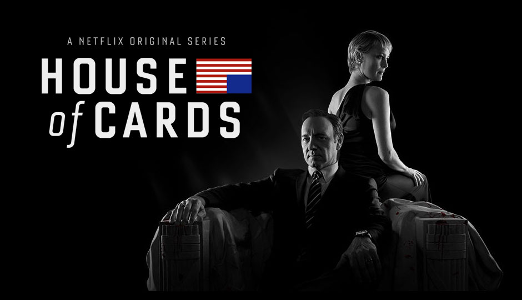
Without a doubt my favourite current ongoing TV show is House of Cards. I really enjoyed Season 1 and luckily jumped on the bandwagon at the right time with Season 2 being released just after I finished with the first. I’ve taken my time to go through the 13 episodes of Season 2, and have been struck yet again with awe at the quality of the show. Here’s my review of Season 2, with a spoiler-filled discussion of the events of the season on the second page.
It’s hard to imagine a TV show that is quite as dark and cynical as House of Cards. Season 1 saw Frank Underwood, the sinister politician with power-driven ambitions, become Vice President of the United States through manipulation of the people around him by any means necessary. His wife was just as ruthless in pursuing her own and her husband’s work goals. Season 2 takes an even seedier look at the world of politics than I thought possible after watching season 1.
The Underwoods are not the only evil people in the show this time round, with almost everyone (apart from maybe the President and his wife) being self-serving, manipulative and downright evil. The main rival of Underwood this season is Raymond Tusk, introduced in Season 1 as the President’s billionaire friend and confidant, who puts up serious resistance to Frank Underwood’s plans to remove him from the political picture and become the President’s right-hand-man himself. Working closely with Tusk is Frank’s former press secretary, Remy Danton – who worked for Frank’s interests in the first season but, as a lobbyist and de facto political mercenary, changed sides to Tusk with the incentive of more money. The conflict between Tusk and Underwood is the driving force of the show, as the rise to power isn’t as clear for Frank as it was last season.
Two new characters emerge that are both very well-played and typify the two-faced nature of the people in the Underwoods’ life. Jacqui Sharp, the chosen successor to Underwood as House Majority Whip is an aptly-named character – not being dictated to by the stronger forces surrounding her in a politically important job. Seth Grayson is introduced as working for Claire as part of her new role as the Second Lady of the United States. His intentions are not always clear, but he eventually develops into a key player in the show. The fact that these new characters can step into the world of House of Cards so cleanly is a testament to the show’s great writing and the acting of both Molly Parker (Sharp) and Derek Cecil (Grayson).
On the whole the acting in the show is once again superb. Kevin Spacey is as magnificent as could be in his portrayal of Frank, with a feeling of unease growing inside me every time I look into his eyes. Robin Wright is once again fantastic as Claire, proving to be an emotional reference point for the show more so than before. Michael Gillgets far more screen time in this season as President Walker, who is working much closer with Frank than before, and I believe his is the most improved acting performance in the entire series – going from what was perhaps a weak link to a strong point.
The storytelling takes a real step up in this season too, from simply following Underwood’s narrative and the events immediately around him to threading many plot lines at once and bringing them together for maximum effect. It leaves the viewer on tenterhooks for the next episode every time. Season 1 felt at times, retrospectively speaking, almost too simple – fearing that it would lose the viewer if it did not keep crystal things clear. Frank explains a lot less to the viewer via the fourth wall this season. Whether it’s a sign that Netflix takes itself and its’ writers and producers more seriously or not, I can’t say, but it certainly appears that way. The only negative comment I could make about the storytelling is that there could really have been more episodes – even though the pace is kept pretty slow for the most part. Certain plotlines aren’t developed as much as I’d have liked them to have been, but this could mean that they are being saved for future seasons, I can’t be sure. For bang for your buck, you can’t get much better than House of Cards – with 13 episodes chock-full of drama.
The web of deceit that goes on in House of Cards can almost be hard to follow at times, but that could be a product of my poor memory rather than bad writing. Characters’ relationships with each other can be extremely complicated, with crossovers abound. It makes the events of the show far more tense, showing the pitfalls and traps being set for other characters before they are reached.
Like Season 1, this season is a slow burner that really ramps up the stakes in the last few episodes of the season. The many plot lines in the show come to an interesting and fitting conclusion. How things continue from that point I’m not sure. Not everything is wrapped up for certain, but there is little conflict on the immediate horizon for Frank.
House of Cards’ did not suffer from second season/sophomore syndrome in the slightest – with another excellent set of episodes that outdoes itself as it goes on. It is one of the finest dramas out there at the moment, and you’d be foolish not to give it a watch. Both season 1 and 2 are on Netflix.
If you have watched the full events of seasons 1 and 2, I’ve written more about the specifics of the plot on the next page. Please don’t read ahead if you haven’t seen all of the episodes yet – you will be spoiling some fantastic television for yourself.